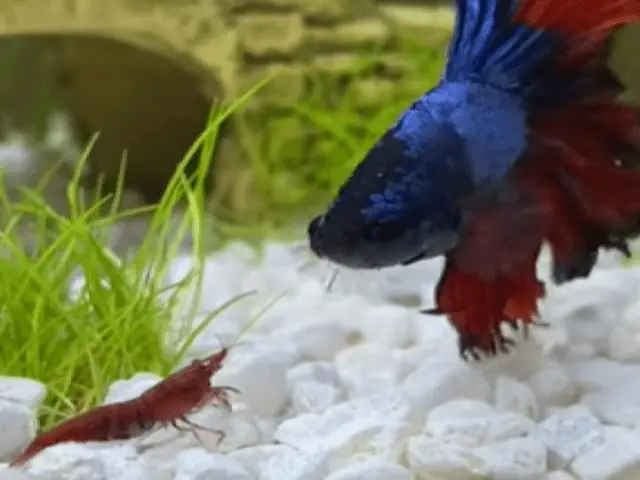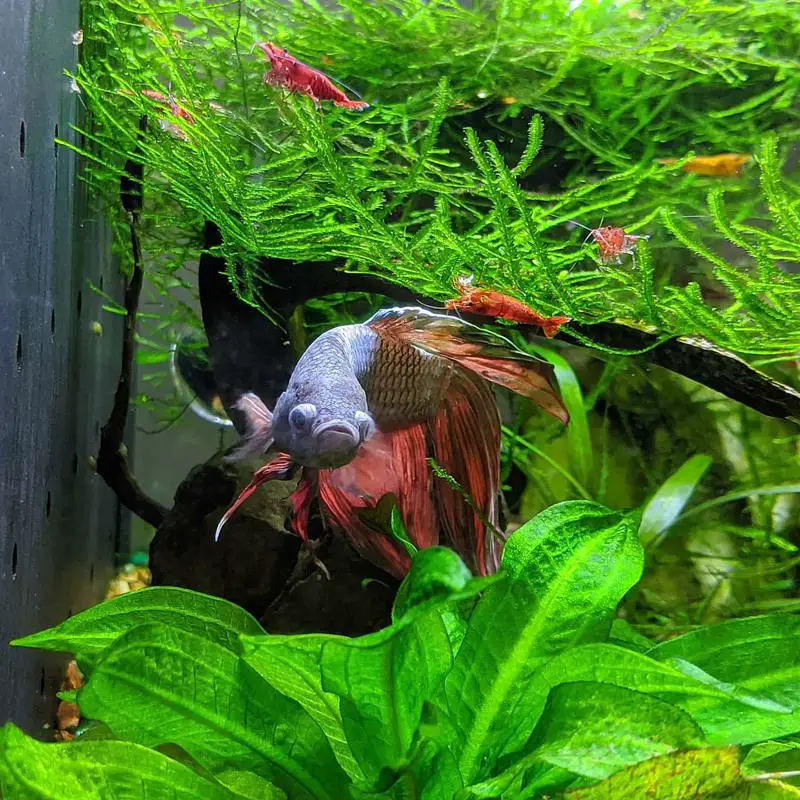Originally posted on May 10, 2023 @ 5:00 am
Last Updated on 7 months by admin
Are you considering adding some variety to your aquarium by pairing shrimp and betta fish together? While this can be a beautiful and exciting combination, it’s important to understand the do’s and don’ts to ensure the safety and well-being of your aquatic pets.
In this article, we’ll explore the factors to consider before introducing shrimp to your betta fish tank, as well as tips on how to create a harmonious environment for both species to thrive. So, whether you’re a seasoned aquarist or a newbie, let’s dive into the world of keeping shrimp and betta fish together.
While it is possible to keep shrimp and betta fish together, there are some important factors to consider. Do choose a tank size of at least 10 gallons, provide plenty of hiding places for the shrimp, and monitor their behavior closely. Don’t add too many shrimp at once, choose aggressive or fin-nipping bettas, or overfeed the tank. With proper care and attention, your shrimp and betta can coexist peacefully in the same tank.

Keeping Shrimp and Betta Fish Together: Do’s and Don’ts
Having a shrimp tank is a beautiful addition to any aquarium. They are fascinating to observe and add a unique dimension to the underwater world. If you are a Betta fish lover, you may be wondering if it’s possible to keep shrimp and Betta fish together. The answer is yes, but it requires careful consideration and preparation.
Do: Ensure Sufficient Space for Both Shrimp and Betta Fish
When considering keeping shrimp and Betta fish together, it’s crucial to ensure that there is enough space for both species. Betta fish are territorial and aggressive, which can lead to problems with shrimp. Therefore, it’s essential to provide enough hiding places for the shrimp. Having a heavily planted aquarium with rocks, caves, and driftwood can create hiding spots for the shrimp and minimize stress caused by the Betta fish.
It’s also important to note that shrimp are sensitive to water parameters, so ensure that the water quality is stable. A heavily planted aquarium can help with this as plants absorb excess nutrients and provide oxygen for the shrimp.
Don’t: Keep Small Shrimp with Adult Betta Fish
Adult Betta fish have larger mouths, which can make them a threat to small shrimp. Therefore, it’s recommended to keep larger shrimp species such as Amano or Ghost shrimp with adult Betta fish. However, juvenile Betta fish may be more curious than aggressive and may not pose a significant threat to small shrimp.
It’s also essential to monitor the Betta fish’s behavior closely. If the Betta fish shows signs of aggression towards the shrimp, it’s best to remove the shrimp immediately to prevent any harm.
Do: Provide a Varied Diet for Both Shrimp and Betta Fish
A varied diet is essential for both shrimp and Betta fish. Betta fish are carnivorous and require a protein-rich diet, while shrimp are omnivores and require a mix of plant and animal-based foods. Feeding your Betta fish and shrimp a varied diet can help keep them healthy and happy.
It’s recommended to feed your Betta fish high-quality pellets or frozen foods such as bloodworms or brine shrimp. For the shrimp, a mix of algae wafers, sinking pellets, and blanched vegetables such as zucchini or spinach can provide a balanced diet.
Don’t: Add Shrimp to a New Betta Fish Tank
Adding shrimp to a new Betta fish tank can be risky as Betta fish are territorial and may view the shrimp as a threat. It’s recommended to wait until the Betta fish has settled into their new environment before introducing shrimp. This can take up to two weeks, depending on the Betta fish’s personality.
It’s also important to avoid overcrowding the aquarium when adding new shrimp. A sudden influx of shrimp can cause stress and aggression from the Betta fish.
Do: Provide a Suitable Environment for Shrimp
Shrimp require specific environmental conditions to thrive. They prefer a temperature range of 72-82°F and a pH range of 6.5-8.0. Providing a suitable environment for the shrimp can help reduce stress and prevent health issues.
It’s also recommended to provide a consistent light cycle for the aquarium. Shrimp require a regular day and night cycle to stay healthy.
Don’t: Keep Shrimp with Sick or Injured Betta Fish
Keeping shrimp with sick or injured Betta fish can be dangerous for both species. Sick or injured Betta fish may view the shrimp as an easy target and become aggressive. Additionally, sick or injured Betta fish may have a weakened immune system, making them more susceptible to disease.
It’s recommended to quarantine sick or injured Betta fish and treat them accordingly. Once they have recovered, reintroduce them to the aquarium slowly.
Do: Use a Proper Aquarium Cover
A proper aquarium cover is essential when keeping shrimp and Betta fish together. Betta fish are known to jump out of the water, and shrimp may crawl out of the aquarium if they feel threatened. Using a cover can help prevent any accidents and keep your aquatic pets safe.
It’s also important to ensure that the aquarium cover has small openings to allow proper air circulation.
Don’t: Keep More Than One Betta Fish in the Same Tank
Keeping more than one Betta fish in the same tank can be dangerous and stressful for both species. Betta fish are territorial and will fight with other Betta fish, potentially leading to injury or death.
It’s recommended to keep one Betta fish per tank and provide enough space and hiding spots for the shrimp.
Do: Observe Your Aquarium Regularly
Regular observation of your aquarium can help prevent any potential problems. It’s essential to monitor the Betta fish’s behavior towards the shrimp and ensure that the water quality is stable. If you notice any changes in behavior or water quality, it’s recommended to take action immediately to prevent any harm to your aquatic pets.
Don’t: Overfeed Your Shrimp and Betta Fish
Overfeeding your shrimp and Betta fish can lead to health problems such as obesity and poor water quality. It’s recommended to feed your aquatic pets small amounts of food multiple times a day. This can help prevent overfeeding and ensure that your pets receive a balanced diet.
In conclusion, keeping shrimp and Betta fish together can be a rewarding experience if done correctly. It’s essential to provide enough space, hiding spots, and a varied diet for both species. By following these do’s and don’ts, you can create a healthy and happy environment for your aquatic pets.
Frequently Asked Questions
Can shrimp and betta fish be kept together?
Yes, shrimp and betta fish can be kept together in the same aquarium. However, there are some important considerations to keep in mind to ensure the safety and well-being of both species.
First, it’s important to choose the right type of shrimp. Amano shrimp and cherry shrimp are good choices because they are hardy and can defend themselves against curious bettas. Ghost shrimp and bamboo shrimp, on the other hand, may not fare as well.
Second, make sure the aquarium is large enough to provide plenty of hiding spots and swim space for both the shrimp and betta. The aquarium should also be heavily planted to provide cover for the shrimp.
What should I feed my shrimp and betta fish?
Betta fish are carnivorous and should be fed a high-protein diet consisting of pellets, frozen or live food. Shrimp are omnivorous and will eat algae, detritus, and leftover food.
To ensure that both your shrimp and betta are getting the proper nutrition, it’s important to feed them separately. Use a feeding dish or feed the betta at one end of the aquarium while dropping shrimp food at the other end.
Can betta fish eat shrimp?
Yes, betta fish are known to eat shrimp, especially if they are hungry or if the shrimp are small enough to fit in their mouths. However, this can be prevented by providing plenty of hiding spots and cover for the shrimp.
If you notice that your betta is consistently eating your shrimp, it may be necessary to separate them into different aquariums.
How often should I clean the aquarium?
It’s important to maintain a clean and healthy environment for both your shrimp and betta. Regular water changes and tank cleanings are necessary to keep the water parameters in check and remove excess waste.
For a small aquarium with shrimp and betta, a water change of 20-30% every week is recommended. Make sure to vacuum the substrate and clean any decorations or plants as well.
What are some signs of stress in shrimp and betta fish?
Stress can have a negative impact on the health of both your shrimp and betta fish. Signs of stress in shrimp include hiding, not coming out to feed, or changing color.
Signs of stress in betta fish include lethargy, loss of appetite, clamped fins, or hiding. If you notice any of these signs, it’s important to identify and correct the cause of stress as soon as possible.

Can betta fish live with shrimp? 🦐 Will bettas eat shrimp?
In conclusion, keeping shrimp and betta fish together can be a challenging task, but it is possible with the right approach. First and foremost, it’s essential to understand the temperament of the betta fish and choose compatible shrimp species. Secondly, providing adequate hiding places and a well-balanced diet for your shrimp can help reduce the risk of them becoming betta food. Lastly, maintaining excellent water quality and monitoring the tank regularly is crucial to prevent any undesirable behavior or disease outbreak.
Overall, keeping shrimp and betta fish together can create a beautiful and vibrant aquarium, but it requires careful planning and proper execution. By following the do’s and don’ts outlined in this article, you can enjoy a thriving aquatic environment for years to come. Remember, with patience and dedication, anything is possible in the world of aquarium keeping.
